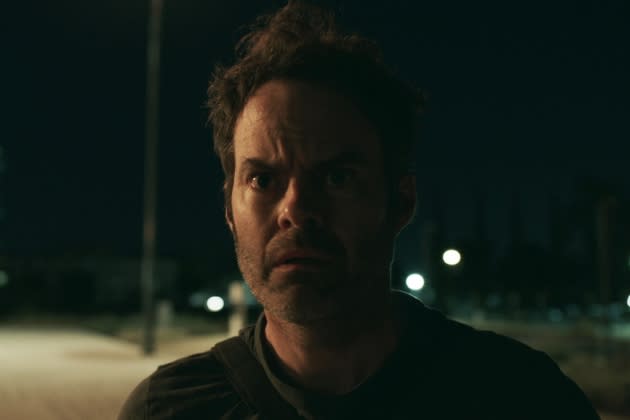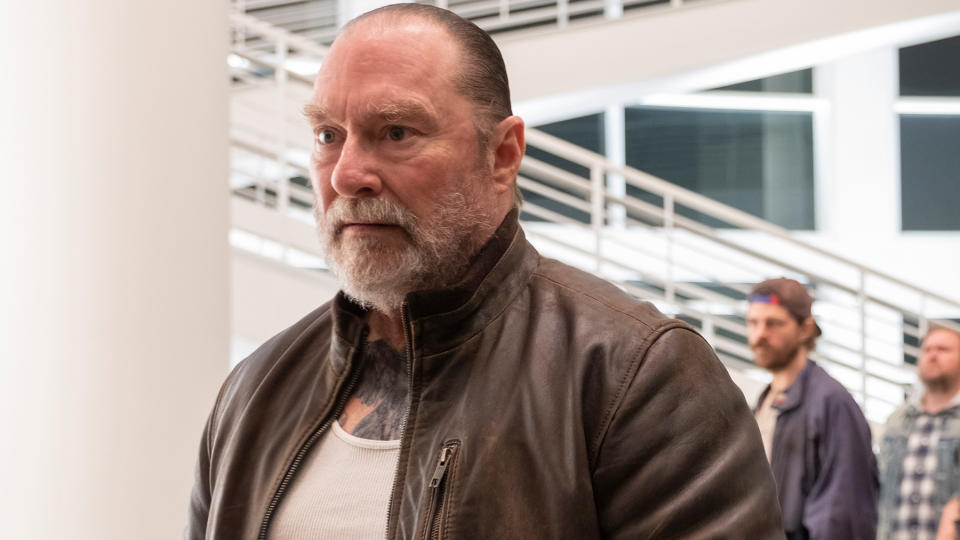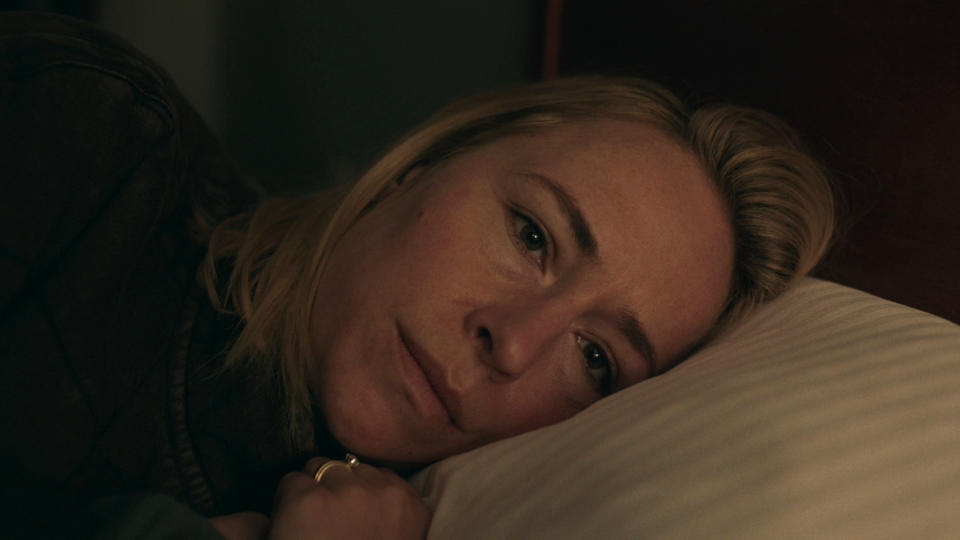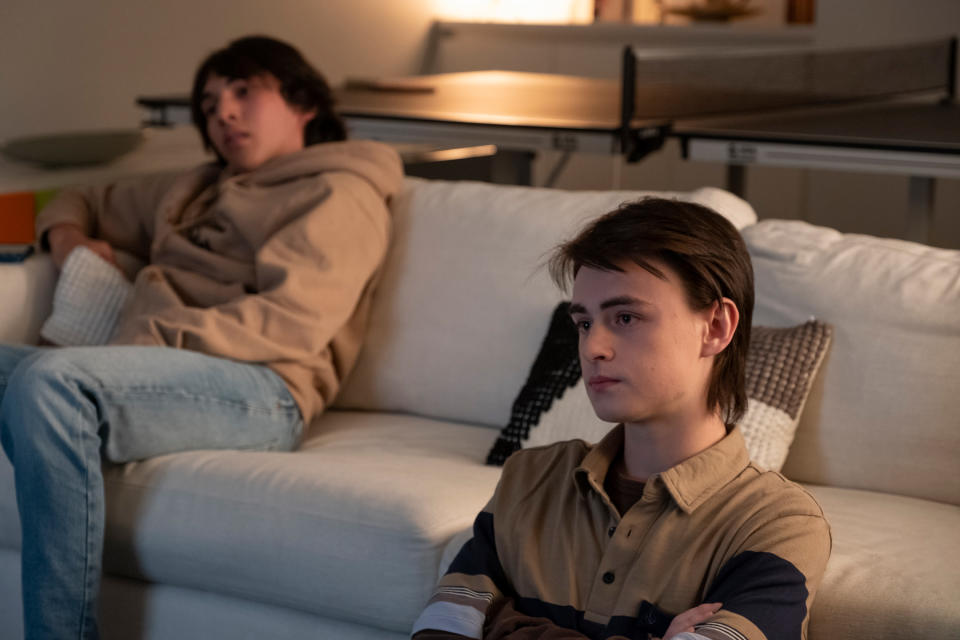‘Barry’ Finale Is Filled With Blood and Disappointment
- Oops!Something went wrong.Please try again later.
- Oops!Something went wrong.Please try again later.
- Oops!Something went wrong.Please try again later.

This post contains spoilers for the Barry series finale, “Wow.”
“Denial, it’s tough.”
More from Rolling Stone
Sarah Goldberg's 'Barry' Exit Interview: Sally's Finale Secrets and More
'Barry' Finale: Henry Winkler on That Shocking Revenge Moment
This line by Monroe Fuches is perhaps the most important sentiment expressed at any point during these four seasons of Barry. The series began as a Hollywood satire, illustrating the thin line that exists between killing on stage and killing in real life. Over time, though, it became about a different kind of performance: the ones we do for ourselves, rather than for each other, in an attempt to push away the truths we don’t want to have to confront. So Gene Cousineau positions himself as a great actor wronged by the system, rather than as a jerk nobody wanted to work with. Sally Reed misrepresents the story of her abusive relationship in Joplin because she’s ashamed of what she actually did. NoHo Hank styles himself as a slick operator to cover for the fact that he’s afraid to do all of the brutal things required of a master criminal. And Barry Berkman keeps telling himself that he is a good person, in spite of the trail of bodies in his wake.
All of this comes to a head in a sequence not featuring the title character at all. Barry is en route to confront Hank and kill anyone who stands between himself and Sally and John(*), but in the meantime, we see Hank’s men and the Raven’s flock squaring off in the lobby of NoHoBal’s corporate headquarters. Fuches has spent the last few episodes giving the most extreme performance of them all as the Raven, but the news that Barry has a son, coupled with the guilt he still feels about being such a terrible father figure to Barry, has ever so slightly snapped him back to reality. So rather than seek vengeance, Fuches offers Hank an out: if Hank can stop his own current performance and admit that he played a role in Cristobal’s death, Fuches will walk away and never trouble him again. Fuches admits that he has been lying to himself in different ways for a long time, and even acknowledges that the only thing that will make you forget the awful things you’ve done is “by being someone else.” Hank understands exactly what Fuches is saying, and he knows what a good deal he is being offered. But the pain of Cristobal is still so raw and deep all these years later, Hank would rather risk death than admit what he did, whether to himself or to others. So he calls Fuches a liar and curses him out, leading to one final orgy of Barry violence, much of it presented as a single, astonishing take that reveals the grisly aftermath of the shootout between these two armies. Fuches has survived by immediately diving on top of John to protect the kid — the first truly good thing he has done for Barry in a very, very long time — and Sally appears safe behind a column, if terrified and distraught, but everyone else is either dead or dying in graphic ways, like the man with his leg blown off, or the one whose guts are spilling out of him.
(*) This is preceded by a darkly hilarious sequence where Barry charges into the big box store he visited a couple of episodes ago, demanding guns, then marches out with an arsenal strapped to him — which in turn makes it very difficult for him to get into the driver’s seat of his rental car.

And even after this, the performances aren’t quite done. Hank is mortally wounded from Fuches’ gunshot, but he makes sure that his final moment is reaching out to take the hand of the bronze Cristobal statue, so that he will die in a a perfect pose demonstrating his love for the man whose murder he could not, would not, prevent. We see the life leave his eyes — Anthony Carrigan is incredible in this moment — and hear the sounds of birds chirping and wind swirling, perhaps signaling that Hank has wound up on the now-familiar Beach From Hell. Fuches, meanwhile, gets to play the role of surrogate dad one last time, sending John safely back to Barry as a silent means of apologizing for how he turned both himself and Barry into monsters(*).
(*) Stephen Root: also incredible in this one!
It’s something of a surprise that Bill Hader and Alec Berg chose to put the big action sequence so early in the finale, and to leave Barry out of it altogether. But the creators have something else in mind for their protagonist.
Earlier, we see Sally give up her own denial, telling John that Barry is a murderer, that she is too(*), and that she also realizes she’s been a terrible mother. So when she and Barry watch John sleep in the aftermath of the shootout, it’s not surprising that she tells Barry that it’s time to turn himself in. She has finally let herself clearly see who they are and what they’ve done, but Barry hasn’t been willing or able to do the same. He leans back on his self-serving religious beliefs, insisting that God wants something else for him. We’ve seen Barry do far worse things over the life of the series, but this may be him at his most exasperating.
(*) “Murder” is perhaps not the proper term for what Sally did to a man who tried to kill her, but she still carries tremendous guilt over it, so the hyperbole is understandable.
Barry wakes up to discover that Sally has absconded with John during the night, no longer able to stand the violence and the lies that he dispenses in equal measure. He assumes she has gone to see Cousineau. But Gene’s only houseguest is his agent Tom. And in one more ironic twist, Gene now finds himself trapped in a role he had very little to do with, since the cops mistakenly believe he was the mastermind behind Janice’s death and many others, and a collaborator with the Chechens(*). Even Leo now assumes that his dad shot him not by mistake, but to stop Leo from telling anyone that his house was paid for with drug money by Gene. Gene finally has all the notoriety in the world, but it’s not at all the kind he wants.

(*) Even given the misunderstanding, it remains utterly baffling that Jim Moss would have left Barry alone in his garage last week. Whether or not Gene ordered the hit, Barry is the one who actually killed Jim’s daughter, and Jim does almost nothing to secure him and ensure that he faces justice again. Plus, once this all came to light, wouldn’t Barry’s FBI friend Albert come back to tell the local cops what he uncovered about Barry’s hitman work last season? Plot-wise, the series has often operated on cartoon logic, which is how Barry managed to avoid arrest several times in the past. But the show tries to be true to the emotional experience of these characters, and it’s hard to imagine the Jim Moss we’ve watched these last two seasons making these choices, and being so easily fooled.
But when Barry goes looking for Sally and John at Gene’s house, Tom — who, moments earlier, was attempting to slip out of this mess with suitcase in hand — is somehow able to get through to him in a way Sally wasn’t. Faced with the loss of his family, as well as the damage he has now done to Gene, Barry finally takes a breath and agrees to turn himself in. But his truth gets fatally trumped by Gene’s, as Cousineau kills him with Rip Torn’s prop gun. Having his name cleared ultimately matters less to Gene than getting vengeance on behalf of Janice, so he murders the man who could tell police the truth(*).
(*) Henry Winkler spoke with Rolling Stone about how he viewed Gene’s motivations for this scene, as well as the whole Barry experience.
It is one last shocking turn of events for the series. It’s not that Barry dies, but the abrupt way in which it happens, with him only being able to mutter, “Oh, wow” in between being shot in the chest and being killed by a head shot. And it’s the fact that it happens with a good chunk of the episode still to go. But the swiftness of it, and particularly the Sopranos-esque cut to black, feels very true and right to the aesthetic Hader and Berg have established over four seasons. This is not a movie fantasy, and Barry Berkman is not going to go down in the blaze of glory he expected to when he went to Hank’s office. His death is small and swift and ugly, with no time for a big speech.
What follows is an interesting but ultimately frustrating attempt to underline that exact point. We jump years into the future. Sally is now a high school drama teacher, in a place far from L.A. where it snows in the winter. John is a teenager, now played by Jaeden Martell from It. While Sally goes home to bask in the success of her school production of Our Town, John goes to his friend Eric’s house to finally watch The Mask Collector, the film that eventually got made about Barry and Gene, presenting Barry as a wrongly-accused hero and victim, and Gene as the evil genius responsible for everything.
Even beyond all the facts it gets wildly wrong, The Mask Collector is the hacky Hollywood version of the story we’ve been watching for the last four seasons. The dialogue is laden with clichés, Barry and Gene’s early teacher-student relationship is uncomplicated and straight out of the inspiring professor playbook, and the action has absolutely none of the distinctiveness that Hader and company have deployed on the series. In some ways, the sequence plays less as satire than as a celebration of Barry itself: reminding us one last time of how great and unique it was by letting us see how bad this material could have been handled.

But it doesn’t quite work as a closing note, for two reasons. The first is that, again, it is hard to fathom how Barry could have been posthumously cleared of all wrongdoing, and that Cousineau would have taken the fall for every single bad thing that happened over these four seasons. Again, cartoon logic, yada yada, but the series has kept just enough of a toe dipped into the real world that it requires some pretty massive leaps in logic for this to work. You could handwave some of it away as The Mask Collector playing fast and loose with the facts in the manner of many Hollywood biopics. But this is the only version we’re seeing of how the story has been interpreted by the public, and John’s reaction to it suggests that this is the interpretation he can believe, because he’s never heard another one.
Perhaps that is meant to be one final instance of a Barry character in denial, playing a role — in this case, John choosing to play the son who tragically had to grow up without his heroic, innocent father — because it’s easier than accepting the truth. But we know so little about John in general, and have seen nothing of this older John, who endured a traumatic, horrifically violent experience when he was younger, who heard his mother tell him that she and Barry were both murderers, and has since been raised by that same mother, who already decided to take responsibility for her actions and stop lying to herself and others. The Sally we saw in this episode does not seem like she would have gone back to lying about all of this. Maybe she wouldn’t have forced all the gory details on her son, even at this age, but she wouldn’t have let him believe that Barry was a great man done wrong by his manipulative acting teacher.
Regardless, it is a lot to hang on such a minor, late addition to the series, particularly when Sally is right there in the epilogue, driving home alone after politely turning down another teacher’s attempt to ask her out on a date. There’s a version of the ending where Sally — whom we know so well, and who has been so spectacularly played by Sarah Goldberg — is central to the final satirical/emotional beat of the series. But she’s off on her own, and we are watching John, who barely even qualifies as a character.
There is so much greatness in the finale, just as there has been in Barry as a whole, but it’s an oddly muted way to go out — even if you consider the real end of the story to be Barry’s final words and the cut to black.
Best of Rolling Stone

